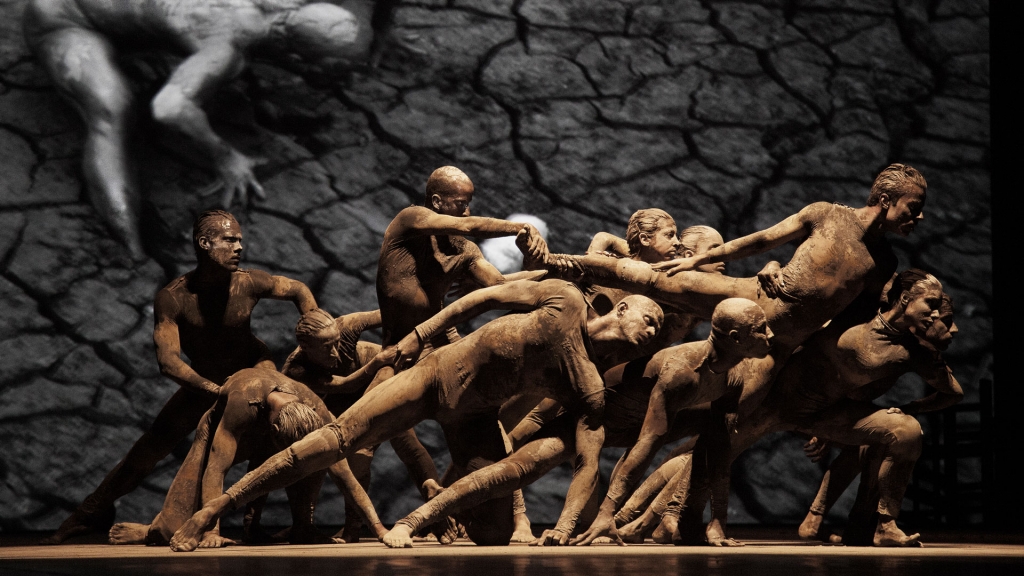The Companhia de Dança Deborah Colker was founded in 1994 and went on stage for the first time with Vulcão (Volcano). Although a beginner, the company was invited to open the “O Globo em Movimento” Festival in Rio’s Municipal Theater, one of the most important theatres in Brazil. The explosion happened the following year with Velox. The show, famous for its scene on a climbing wall, became a pop phenomenon.
In 1996, the company had its first world premiere outside of Brazil. Staged especially for the prestigious Lyon Dance Biennial, Mix (a mix of Vulcão and Velox) launched the company internationally, and five years later the show received the stamp of excellence by the Society of London Theatre, receiving the 2001 Laurence Olivier Award, in the category "Outstanding Achievement in Dance", an honor never before granted to a Brazilian artist or group.
Since then, the Companhia de Dança Deborah Colker has toured the four continents, performing on some of the most important stages in the world, such as the John F. Kennedy Center (Washington, EUA), Joyce Theater and New York City Center, Harbourfront Centre (Toronto, Canada), Barbican Centre (London, England) Birmingham Hippodrome (England), The Play House and Festival Theatre (Edinburgh), Maison de la Dance (Lyon, France), Centro Cultural de Belem (Lisbon, Portugal), Admiral Spalatz (Berlin), Stopera Muziektheater (Amsterdam), Esplanade Theatre (Singapore), Hong Kong Cultural Grand Theatre, Macau Cultural Centre (China), Kanagawa Arts Centre (Tokyo, Japan), Tel Aviv Opera House, Royal Opera House Muscat (Oman), Westpactrust St James Theatre (Wellington, New Zealand), Teatro Nacional Cervantes e Opera Allianz (Buenos Aires, Argentina), among many others.
Research on the relationship of body and space resulted in Rota (Route) (1997), Casa (House) (1999) and 4 por 4 (4 by 4) (2002). Parts of Velox and Rota were joined in 2016 to make Vero, a production that became the key-piece of the repertoire.
With Nó (Knot) (2005) and Cruel (2008), Deborah entered a phase she considers more existential, touching on themes such as love and desire. Between the two she created Dínamo, which was still called Maracanã when it was included in the programming for the 2006 World Cup, in Germany.
Approaching literature became the next challenge. Tatyana (2011) was based on the novel in verse Evguêni Oniéguin, by Russian Alexsandr Púchkin. And Belle (2014) was freely inspired by Belle de jour, by the Franco-Argentine writer Joseph Kessel – and transformed into film by Luis Buñuel.
With Cão Sem Plumas (Dog Without Feathers), in 2017, the company sets out for another relationship with words, now the poetry of João Cabral de Melo Neto, confirming continual transformation.
Cão Sem Plumas received the Benois de la Danse Award 2018 at Moscow for its choreography.
Fondée en à Rio de Janeiro, la Companhia de Dança Deborah Colker à Rio de Janeiro monte sur scène pour la première fois en 1994 avec Vulcão (Volcano). Déjà l’année suivante, la compagnie est invitée à ouvrir le festival "O Globo em Movimento" au théâtre municipal de Rio, l'un des plus importants théâtres du Brésil. L'explosion se produit l'année suivante avec Velox. Le spectacle célèbre pour sa scène sur un mur d'escalade devient un phénomène pop.
En 1996, la compagnie présente une première mondiale en dehors du Brésil. Mis en scène spécialement pour la prestigieuse Biennale de la danse de Lyon, Mix (un mélange de Vulcão et de Velox) a lancé la compagnie sur la scène internationale. Cinq ans plus tard, le spectacle a reçu le label d'excellence de la Society of London Theatre, en recevant le Laurence Olivier Award 2001, dans la catégorie ‘Outstanding Achievement in Dance’, un honneur jamais accordé auparavant à un artiste ou un groupe brésilien.
Depuis lors, la Companhia de Dança Deborah Colker a parcouru les quatre continents, se produisant sur certaines des scènes les plus importantes du monde, telles que le John F. Kennedy Center (Washington, EUA), Joyce Theater et New York City Center, Harbourfront Centre (Toronto, Canada), Barbican Centre (Londres, Angleterre) Birmingham Hippodrome (Angleterre), The Play House et Festival Theatre (Edimbourg), Maison de la dance (Lyon, France), Centro Cultural de Belem (Lisbonne, Portugal), Admiral Spalatz (Berlin), Stopera Muziektheater (Amsterdam), Esplanade Theatre (Singapour), Hong Kong Cultural Grand Theatre, Macau Cultural Centre (Chine), Kanagawa Arts Centre (Tokyo, Japon), Tel Aviv Opera House, Royal Opera House Muscat (Oman), Westpactrust St James Theatre (Wellington, Nouvelle-Zélande), Teatro Nacional Cervantes e Opera Allianz (Buenos Aires, Argentine), entre autres.
La recherche sur la relation entre le corps et l'espace a donné lieu à Rota (Route) (1997), Casa (House) (1999) et 4 por 4 (4 par 4) (2002). Des parties de Velox et de Rota ont été réunies en 2016 pour donner naissance à Vero, une production qui est devenue la pièce maîtresse du répertoire.
Avec Nó (Knot) (2005) et Cruel (2008), Deborah Colker est entrée dans une phase qu'elle considère plus existentielle, abordant des thèmes comme l'amour et le désir. Entre les deux, elle a créé Dínamo, qui s'appelait encore Maracanã lorsqu'il a été inclus dans la programmation de la Coupe du monde 2006, en Allemagne.
Son prochain défi chorégraphique est l'approche de la littérature dans ses créations. Tatyana (2011) est basée sur le roman en vers Evguêni Oniéguin, du Russe Alexsandr Púchkin. Et Belle (2014) était librement inspiré de Belle de jour, de l'écrivain franco-argentin Joseph Kessel - et transformé en film par Luis Buñuel.
Avec Cão Sem Plumas (Chien sans plumes), en 2017, la compagnie se lance dans une autre relation avec les mots, désormais la poésie de João Cabral de Melo Neto, confirmant une transformation continue.
Cão Sem Plumas a reçu le prix Benois de la Danse 2018 à Moscou pour sa chorégraphie.



